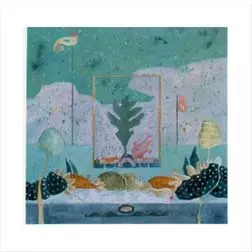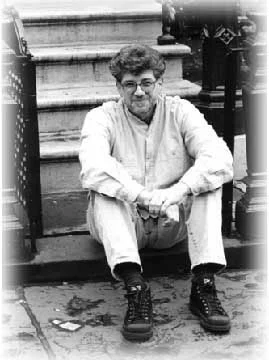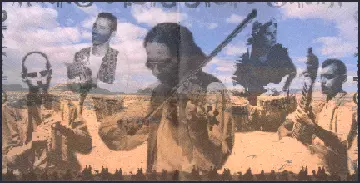

February 2001This is a repeat of our January edition while we are busy laying the groundwork for a new online publication and a quarterly version. Please return to celebrate the upcoming Levantine Review with us.
Assessing Two Decades of Ammiel Alcalay
by David Shasha
A Review of Jewish Communities in Exotic Places
by David Shasha
The True Adventures of a Syrian American Writer: Joe Sutton's Story
Jewish Time in Berkeley
by Jordan Elgrably
Two Reviews of "Morocco," the New Show at the Jewish Museum
by Habiba Boumlik/Dalia Kandiyoti + Holland Cotter (NY Times)
Sephardic Halakha As an Alternate Paradigm for Authentic Jewish Continuity
by Zvi Zohar
February Calendar send us your news and views
Jewish Music Festival March 10-17, SF Bay Area
Inside News: Upcoming Meetings

"Variations on an Oak Leaf II" by Desy Safan
Salud, Amor e Inspiración en 2001
In Retrospect: Assessing Ammiel Alcalay's Contribution to Sephardic Culture
By David Shasha
I recently purchased a copy of the long out-of-print novel by Albert Cohen, Levantine man of letters, called Solal. Albert Cohen was just one of the many writers brought back to consciousness, Sephardic and otherwise, by a scholar whom I was introduced to in 1982 named Ammiel Alcalay. With a recently published collection of essays, Memories of Our Future---essays that span roughly the entire period that I know Ammiel---I felt it important to look back at his work and assess its significance after nearly two decades.Many of us grew up in a Sephardic world that was in the process of disintegrating. Fewer people who were of the old world had any great impact on the young second generation Americans who, by and large, were ushered into Ashkenazi Jewish modernity. As a member of that generation that was reoriented to the new system and locked out of the old, my own itinerary is both typical and out of the ordinary. I grew up in a place that maintained but faint traces of its past and, indeed, had begun to shut off from the world.
The work of Ammiel Alcalay must be understood as part of a continuum of post-modern Judaism that had been begun by Susan Handelman with her Slayers of Moses. Handelman read deeply in texts that had been ignored or thought trivial by many Jewish thinkers to that point: In the writings of Harold Bloom, Jacques Derrida and Jacques Lacan, Handelman heard echoes of these ancient Jewish texts. Handelman did not fix her sights on the Bible, that most seminal of documents, but, in the manner of the so-called Post-Structuralists, she turned her attention to the massive interpretive literature of the Jewish Sages, known as Midrash. The Hakhamim developed a massive intellectual culture that not only interpreted the classic writings of the Bible, but were the ones who put those writings in the canonical order that we have them in today.
Jewish Communities in Exotic Places is an admixture of cultural anthropology and reporting which offers an overview of 17 Jewish groups that have been referred to in Hebrew as edot ha-mizrach, Eastern or Oriental Jewish communities. Another translation of the phrase is "the tribes of the east" and is the reason why a new generation of Israelis from these communities made a political statement when they began to call themselves mizrahim in the late 1960s and '70s. That is, Jews of Europe and the Americas in Israel, the Ashkenazim, erred in calling these Jews "tribes" while referring to Ashkenazim as "the Jewish people." [editor's note]Exotic Jews of the Middle East
a critical review by the numbers ofJewish Communities in Exotic Places, Ken Blady (Aronson 2000)
By David Shasha
Ken Blady is connected to the Orientalist anti-Sephardim which includes Norman Stillman, Bernard Lewis and others. A number of points:1. He does not speak Arabic and has done no research in the field in terms of speaking with the people he writes about.
2. His work is an arm of the Israeli government that seeks to analyze the political status of the Diaspora communities. To this end, each of his chapters begins with a statement on Muslim anti-Semitism and the dhimmi status of Jews in these places.
3. There is no discussion of the community's history as it relates to culture and creativity. It would be like writing an assessment of the Polish Jewish community on the basis of Auschwitz and the Nazis alone.
The Truth As I Saw It: Joseph Sutton's Story
Syrian Jewish writer and Los Angeles native Joe Sutton (b. 1940) has just published his first novel. Morning Pages, the Almost True Story of My Life (Creative Arts Book Co., Berkeley 2000), is a loosely fictionalized version of his youth growing up in L.A. during the 1950s, one of five boys of a Syrian family from Brooklyn. After a promising high school football career, Sutton wona football scholarship to the University of Oregon. It wasn't until the late 1960s while he was working as a teacher in South-Central, however, that Sutton realized he wanted to become a writer. And where else do aspiring writers go to live the boho life and write fiction? San Francisco. A familiar face on the Bay Area writers scene, these days Joe Sutton writes for a variety of magazines, including Writer's Digest and Writers' Journal. He has written many short stories and his first collection, The Immortal Mouth and Other Stories, will be published in 2001 by Creative Arts.
click here to read about Sutton's recent reading and a brief Q & A
Jewish Time in Berkeley
While visiting Berkeley recently, I learned of the Judah Magnes Museum's new exhibit, "Telling Time: To Everything There is a Season," which is the Magnes' most extensive exhibit in its 37-year history (the show remains in place through November 2001). Right before I arrived, in fact, the exhibit apparently doubled in size, and now includes a few items from other cultures, among them Tibetan, Mexican and African-American. Time seemed an excellent subject to explore the very meaning of Jewish identity and the relationship between Jewish and other cultures in a historical framework. As the museum's executive director, Susan Morris notes, "Every culture uses traditionas to mark time. The more people understand how one culture lives, the more they may understand another. By collecting and displaying works as a public trust, we hope to help fight intolerance."
"Morocco"
at the Jewish Museum
Habiba Boumlik and Dalia Kandiyoti


Photo of Esther Play for Purim,Tanger, 1914
Hamsas, amulets against "the evil eye"
The show on Morocco runs through early February at the Jewish Museum. While the organizers of the exhibit, including Dr. Vivian Mann, are frank about their use of Orientalist imagery, "Morocco" may well represent a lost opportunity. One might have anticipated a different kind of show, displaying both the folkloric and exotic aspects that are the focus of this exhibit, but also including a range of creative and intellectual works of Moroccan Jewry. Dedicated largely to artifacts and displaying few traces of modernity, this exhibit emphasizes the timeless, instead of the continuous culture of Moroccan Jewry.There are over 180 objects displayed relating to various aspects of religious, artistic, and economic life. The brief historical context offered in the first room underlines the close ties between Jews and Muslims; of special notice is the declaration of King Mohamed V, who refused to apply certain Vichy laws in Morocco; when asked during WWII by a Nazi commander, the monarch replied, "We have no Jews in Morocco. Only Moroccan citizens." In this room one also finds a menorah dating back to the 4th or 5th century, a testimony to the length of Jewish settlement in Morocco.
continue reading the review here
Sephardic Halakha As an Alternate Paradigm for Authentic Jewish Continuity
Zvi Zohar
Shalom Hartman Institute
JerusalemIntroduction
In this article, I shall attempt to characterize the response of Sephardic rabbis to the challenges of modernity. My general thesis is that their response is different, in significant and interesting ways, from that of their Ashkenazic-European peers. Moreover, the modalities of this "difference'" suggest valuable alternate paths of Jewish authenticity, beyond the denominational schism that has shattered Occidental Jewish life in modern times.The Coalescence of Orthodoxy in Europe
In the 18th and 19th centuries, European Jewry underwent processes of Haskalah ("Enlightenment") and secularization, accompanied by intense internal social and ideological tensions. Many rabbis felt that these changes threatened the very existence of traditional Judaism and, in order to counter these threats, they formulated a counter-strategy which became known as "Orthodoxy." Understandably, Orthodox leaders declared that they were simply preserving and continuing the ways of life and the beliefs of pre-modern Judaism. However, such contentions are at variance with socio-historical reality, writes Jacob Katz:
The claim of the Orthodox to be no more than the guardians of
the pure Judaism of old is a fiction. In fact, Orthodoxy was a
method of confronting deviant trends, and of responding to the
very same stimuli which produced these trends, albeit with a
conscious effort to deny such extrinsic motivations.1continue here

send us your news and views
February
Calendar
click Calendar for very latest
send
us your news and views
Open through Feb. 11 N.Y.,Morocco: Jews and Art in a Muslim Land, Jewish Museum, 5th Ave. at 92nd St. Exhibit, focuses on Morocco's multicultural art and traditions and the history of Jewish life in Morocco for over 2,000 years. "The exhibition will depict a culture frm the vantage point of 'outsiders'---Orientalist painters and photographers---and from the 'insider's' perspective of the objects Jews created for themselves and others. Vistors will be encouraged to consider the impact of Muslims, Jews, and Europeans on Moroccan cultureóa venerable culture that developed from Berber traditions." (212) 423-3200. www.thejewishmuseum.org
SOLD OUT Feb. 3, L.A., 8 pm Masters of Persian Music in Concert Mohammad Reza Shajarian: vocals, Hossein Alizadeh: tar Keyhan Kalhor: kamancheh and Homayoun Shajarian on tombak, vocals. Bovard Auditorium/USC. They also perform in Portland, San Diego, Santa Barbara and other U.S. cities late in January and throughout February. Persian Arts Society/Kereshmeh Records.Tickets/Info: (310) 470-5177.
Feb. 4 N.Y., SULTANA ENSEMBLE performsìMediterranean Collage.î A Jewish Moroccan musical experience which incorporates Middle Eastern and Western influences into a cross-cultural fusion. This lively family-friendly concert, specially designed to complement the Museum's current Morocco exhibition, will feature violin, ney (Arabic flute), oud (Arabic lute), piano, bass, darbuka (hand-drum), tambourine, and voice and dance. The Sultana Ensemble was founded by composer Yoel Ben-Simhon, a musician and scholar of Jewish music in Morocco. Tickets: $16 general public; $14 students. Free for children under 12. Recommended for children ages 5 and above. For further information and to purchase tickets by phone, please call (212) 423.3337. www.thejewishmuseum.org
Feb. 7 N.Y., 12:30 pm Jews of Iran and Libya in Italy Today Lecture by Prof. Sara Reguer, Graduate Center of the City University of New York, 365 Fifth Avenue (at 34th Street). 12:30-1:45 pm, one in a regular Wednesday lunch series sponsored by the American Sephardi Federation, Institute for Sephardic Studies of the CUNY Graduate Center, and the Broome and Allen Street Boys Fund. Info, (212) 817-1946 or 294-8350.
DON'T MISS THIS PHENOMENAL PERFORMANCE! February 10, 7:30 pm "Return to Sepharad" with Adam and Laila Del Monte Two of the most authentic and talented flamenco performers in the United States will perform a beautiful and complex repertoire of dance and songs which, in part, illustrate the multicultural origins of flamenco music. Adam Del Monte discusses briefly some of his musicological research into the Jewish, Moorish and Spanish beginnings of the genre. This flamenco fusion program takes place at Congregation Ner Tamid, in the South Bay, 5721 Crestridge Road, Rancho Palos Verdes. Reserved seating, $36, general admission $18. Tickets (310) 377-6986 or call Ivri-NASAWI, (323) 650-3157. Coffee and dessert are included.
Through Feb. 25, L.A. The Art of Lidia Shaddow Israeli-born of Iraqi and Tunisian descent, Shaddow exhibits solo with prints and oil paintings at El Portal Center for the Arts, 5269 Lankershim Blvd, North Hollywood. For hours call (818) 508-4234. A find for collectors.
Feb. 11, N.Y. Are They Spaniards LIke Us/Son Españoles como Nosostros? Artist Micael Amato shows cast glass heads and other multimedia works at Yeshiva University Museum/Center for Jewish History, Feb. 11-May 3. Recepton 3-6 pm, Sunday Feb. 11, 15 West 16th St. NYC. (212) 294-8330 Sponsored by the American Sephardi Federation and Mr & Mrs. Arthur Goldberg.
Feb. 12 L.A., 7 pm The Key From Spain: Songs and Stories of Flory Jagoda A film by Ankica Petrovic. Jan Popper Theater, 1200 Schoenberg Music Building, UCLA, enter from Hilgard. Free. For further information call (310) 825-8381. USA, 2000, 40 min, color and b & w. Songs in Ladino with English subtitles. Co-Producers and Directors: Ankica Petrovic, Vlatko Petrovic, and Mischa Livingstone. According to legend, when the Jews were expelled from Spain in 1492, they took with them the keys to their homes and synagogues hoping that one day they would return. They never did, but their Spanish cultural heritage remained a powerful influence in their lives. In this uplifting tale of survival and continuation, acclaimed Sephardic folksinger, Flory Jagoda, tells the story of her life growing up in a musical family in rural Bosnia. As the "keeper of the flame," Flory has single-handedly revitalized a cultural heritage on the brink of extinction. In a celebration of life itself, she sings with warmth and passion, both old songs and new, delighting audiences with her song and moving them with her story.
Feb. 12, L.A., 7:30 pm SYNERGY ON THE POETRY OF YEHUDA HALEVY The eclectic performance group cosponsored in part by the Center for Jewish Culture and Creativity, performs Monday at Greenway Court Theatre, 544 North Fairfax (between Melrose and Beverly) Free parking on the premises. Based on the poetry of Yehuda Halevi, a giant of medieval Spain, this is an evening devoted to music that was written by modern composers using the poetry of Yehuda Halevi. Pieces by Kurt Weill, Ami Ma'ayani, Nabil Azzam, Michael Isaacson and Castelnuovo Tedesco among others. Galina Barskaya, Piano; Jordan Charnofsky, Guitar; Marcia Dickstein, Harp; Susan Greenberg, Flute; and Vanessa Paloma, Voice. Tickets are $12, $10 seniors and students. For more information and to buy tickets call (323) 658-5824.
Feb. 14 N.Y., 12:30 pm The Forgotten Jews-Jews of Greece in Modern Times Lecture by Prof. Steven Bowman, Graduate Center of the City University of New York, 365 Fifth Avenue (at 34th Street). 12:30-1:45 pm, one in a regular Wednesday lunch series sponsored by the American Sephardi Federation, Institute for Sephardic Studies of the CUNY Graduate Center, and the Broome and Allen Street Boys Fund. Info, (212) 817-1946 or 294-8350.
Feb. 15, S.F., MORNING PAGES: THE ALMOST TRUE STORY OF MY LIFE. Thurs., Feb. 15, 7-9 p.m., Joe Sutton reads from his new novel at George Krevsky Art Gallery, 77 Geary, San Francisco, (415) 397-9748. Also Tues., Feb. 20, 5:30 p.m., Books Inc., Laurel Village, 3515 California St., San Francisco, (415) 221-3666; Thus., Feb.22, 7:30 p.m., Borders, 588 Francisco Blvd. W., San Rafael, (415) 454-1400; and Friday, March 9, 7:30 p.m., The Avid Reader, 617 Second St., Davis, CA, (916) 758-4040.

February 17, L.A. 8 pm Poets of War, Exile and Memory: Majid Naficy and Ammiel Alcalay Special musical artist Nabil Azzam opens the evening with Arab and Sephardic music on 'ud and violin, followed by exiled Persian poet Majid Naficy, who will read new and original work. He will be joined by Sephardic poet and translator Ammiel Alcalay. Followed by reception with the artists. Sponsored by Beyond Baroque Literary Arts Center with Ivri-NASAWI and Al Jadid, A Record of Arab Culture and Arts. Saturday, 8 pm, 681 Venice Blvd., Venice, CA 90291. Tickets $7, seating is limited, reserve now. For tickets and information call (310) 822-3006 or (323) 650-3157.
Feb. 20, N.Y., 9 pm Special Performance by George Mgrdichian in Concert at the Cornelia St. Cafe. 29 Cornelia St. (Between Bleecker and West 4th Streets), Greenwich Village, NYC. $12 Cover + 1 drink minimum. Come and hear the sounds of George's magic oud, the haunting Middle Eastern lute. This concert will include instrumental songs and dances from Armenia, Turkey, Greece, Egypt, Morocco and Spain as well as many of George's original compositions. Gerard Edery will also make a guest appearance. "George Mgrdichian is the world's unquestioned master player of the oud." NY Times
"The best exponent of the oud, of which he is an acknowledged master." NY Times "Any history of the oud ever written from here on must include George Mgrdichian." NY Post "Mgrdichian's oud work is smooth, complex, effortless and singing - you must love it!" Sun Reporter
Feb. 21, L.A, 8:00 pm The Levantine Project, organized by Open Tent Middle East Coalition, will hold the fifth of its monthly meetings at Beyond Baroque Literary Arts Center, 681 Venice Blvd., Venice. This educational series is a dialogue group and focuses on (re)building a cooperative and pluralistic society through dialogue, reconciliation, cultural renewal, grassroots initiatives, peace and justice. Open Tent includes diverse non-profit organizations, individuals and businesses who advocate for peace in the Middle East and among Middle Eastern descendents in the United States. Every third Wednesday of the month. RSVP with Open Tent 323-650-3157 or email .
Feb. 21 N.Y., 12:30 pm Building an Archive-Preserving Your Memories Lecture by Vivienne Roumani-Denn, Graduate Center of the City University of New York, 365 Fifth Avenue (at 34th Street). 12:30-1:45 pm, one in a regular Wednesday lunch series sponsored by the American Sephardi Federation, Institute for Sephardic Studies of the CUNY Graduate Center, and the Broome and Allen Street Boys Fund. Info, (212) 817-1946 or 294-8350.
The Progressive Jewish Radio Hour at WBAI broadcasts in New York Sundays, 11 am Tune in locally or go here to listen over the Net.
Through March 1, 2001 SF Bay Area The Jewish Community of Cuba A photo exhibit by Bay Area photographer Dan Heller focuses on virtually every aspect of the Jews of Cuba. Marin Jewish Community Center, 200 North San Pedro Road, San Rafael, CA, 94903. For directions and further details click here.
Feb. 24, 7 pm Treasures From Heaven by Kathleen Alcala A Latina writer of crypto-Jewish descent, Alcala will read from her latest novel, Treasures in Heaven at Cultura Latina, 4125 Norse Way, Long Beach. (562) 982-1515. Set in 19th century Mexico City, the novel explores the feminist movement of the time, and one woman's unplanned involvement in it. Kathleen's work includes accounts of the Jewish community in Mexico City, including a mysterious printer whose shop appears in a different location everyday, and not at all on the seventh.
Kathleen's previous books are Spirits of the Ordinary, The Flower in the Skull, and Mrs. Vargas and the Dead Naturalist. "It is testimony to Ms. Alcala's vivid talents as a storyteller... that we come to care about many of her characters, and to wonder what destinies await them..."- New York Times Book Review
Feb. 26, L.A., 7:45 pm Open Tent cosponsors Ambassador Dennis Ross, former special Middle East Coordinator for the U.S. State Dept, speaking on "Is Peace Still Possible?" At UCLA Hillel, 900 Hilgard Ave. In cooperation with Burkle Center for Int'l Relations at UCLA; Jewish Federation's Community Relations Committee, Center for Jewish Studies at UCLA, Center for Near Eastern Studies at UCLA and the Consulate Gen. of Israel. General admission $12 at the door, doors open at 7 pm, sponsors $36, students free with full-time ID. Call Hillel, (310) 208-3081, ext. 226.
Feb. 27, N.Y. 6pm Gloria De Vidas Kirchheimer Reads From Goodbye, Evil Eye The author reads from her short story collection at the Center for Jewish History, sponsored by Sephardic House. Free. Goodbye, Evil Eye has been nominated as a finalist in the Jewish Book Awards for 2000. Info, (212) 294-6170.
 Feb. 28 L.A. 7:30 pm Conversations on Roots & Identity 4 This popular series raises issues of cultural roots, spiritual practice and affiliation, literary explorations and adjusting to a bicultural, American and Middle Eastern identity. Part four of the new series in L.A. features Libyan-born Penina Solomon sharing stories of her Jewish childhood and adolescence through her art work and poetry. As seating is limited for this free event, you must reserve by phone or email. Los Angeles. Call for directions. RSVP to (323) 650-3157 or email: .
Feb. 28 L.A. 7:30 pm Conversations on Roots & Identity 4 This popular series raises issues of cultural roots, spiritual practice and affiliation, literary explorations and adjusting to a bicultural, American and Middle Eastern identity. Part four of the new series in L.A. features Libyan-born Penina Solomon sharing stories of her Jewish childhood and adolescence through her art work and poetry. As seating is limited for this free event, you must reserve by phone or email. Los Angeles. Call for directions. RSVP to (323) 650-3157 or email: .
February 28 to March 14 Special notice: Purim Trip to Cuba! Purim Trip to visit Jewish Cuba. Leaving from Miami with a slight chance of Los Angeles. Prices: $2740 double occupancy $480 single supplement Included: airfare Miami/Havana/ Miami airfare. Santiago/Havana ground transportationfor all planned activities. Bi-lingual guide. Health and accident insurance. Transfers/airport transfers. Breakfast daily, 8 dinners, 5 lunches Entrance fee to Cannon Ceremony, Havana. Boat ride on Lake Habanilla. For complete details, email June Safran at the Cuba-America Jewish Mission.
March 1, S.F. Semezdin Mehdinovic and Ammiel Alcalay at the Poetry Center. Click here for complete details.

JEWISH MUSIC FESTIVAL SF Bay Area March 10-17 Jewish Music Festival The 16th annual festival emphasizes Sephardi and Mizrahi music. Yair Dalal & Hamza El Din - Internationally acclaimed composers/performers of Israeli, Arabic and Nubian music in a rare collaborative concert cosponsored by Ivri-NASAWI. Pharaoh's Daughter - Hot New York-based world music sextet melding Hasidic, Moroccan, Indian and Turkish melodies and rhythms. Ramón Tasat - Renowned Argentine Cantor singing the rich folk and liturgical music of the Italian, Turkish & Spanish Jews. The Jews of Africa - Lecture and demonstration with performer and African music expert Jay Sand. Za'atar - Mizrahi and Sephardic music performance and community jam session. Shir HaShirim Kabbalat Shabbat Service. Email for further info or call (925) 866-9559.
March 11/17/18 New York Arab World Shorts Festival NYU Cantor Film Center 36 East 8th Street, New York. Nightly Q&A sessions at end of screenings with filmmakers. Organized by Alwan, a non-profit, NYC-based cultural group in association with the Arab Society at NYU. The last decade proved fruitful for Arab independent video and filmmakers. They undertook extraordinary audio-visual experiments and rejuvenated century-old cinematic formulas. Visit Alwan for list of films, times and synopses.[home] [org] [news] [calendar] [membership] [links] [open tent] [past] [poetry]Inside News: Ivri-NASAWI's programming committee will meet on Sunday, Feb. 11, 5-7 pm, to coordinate several upcoming events. Please join us. RSVP first to (323) 650-3157. 400 N. Vista., between Beverly and Melrose, a few blocks east of Fairfax.
*Ivri-NASAWI listsSephardi/Mizrahi and Middle Eastern-related events produced by other organizations. Please be sure to call in your programswith 30 days advancenotice whenever possible.To inquire about our affordableweb rates, call (323) 650-3157.
To inquire about membership in Ivri-NASAWI, click here.
[home] [org]
[news] [calendar]
[membership] [links]
[past] [poetry]